Equus Blu-ray Movie
HomeEquus Blu-ray Movie 
Limited Edition to 3000 - SOLD OUTTwilight Time | 1977 | 137 min | Rated R | Mar 11, 2014
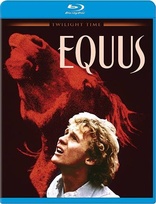
Movie rating
6.9 | / 10 |
Blu-ray rating
| Users | 0.0 | |
| Reviewer | 4.0 | |
| Overall | 4.0 |
Overview
Equus (1977)
A film adaptation of the play by Peter Shaffer, Equus stars Richard Burton as Martin Dysart, a psychiatrist who takes on an unusual case: a young stable boy (Peter Firth) who, in frenzy, has blinded six horses. Their sessions reveal that the boy has a quasi-religious fetish for horses and he rides them in the dead of night, experiencing an ecstasy unlike anything Dysart has ever known. Dysart begins to question: Is the pursuit of normalcy worth the loss of individual passions?
Starring: Richard Burton, Peter Firth, Jenny Agutter, Joan Plowright, Colin BlakelyDirector: Sidney Lumet
| Drama | Uncertain |
| Psychological thriller | Uncertain |
| Mystery | Uncertain |
Specifications
Video
Video codec: MPEG-4 AVC
Video resolution: 1080p
Aspect ratio: 1.85:1
Original aspect ratio: 1.85:1
Audio
English: DTS-HD Master Audio Mono (48kHz, 24-bit)
Music: DTS-HD Master Audio 2.0 (48kHz, 24-bit)
Subtitles
English SDH
Discs
50GB Blu-ray Disc
Single disc (1 BD)
Playback
Region free
Review
Rating summary
| Movie | 4.0 | |
| Video | 4.5 | |
| Audio | 4.0 | |
| Extras | 4.0 | |
| Overall | 4.0 |
Equus Blu-ray Movie Review
Is it smart to horse around with a highly stylized original?
Reviewed by Jeffrey Kauffman March 24, 2014It’s almost always tricky to adapt a stage success to the screen, as countless failed or flawed attempts prove. Screenwriters typically like to “open things up”, in the parlance of cinema, introducing a sense of locale and, frankly, production values that are typically not the common currency of theatrical enterprises, especially plays (as opposed to musicals). But Equus, the thrilling if incredibly intellectual enterprise penned by Peter Shaffer in 1973, was an especially sticky wicket to conquer. The original stage piece played out with virtually no set and further utilized a patently theatrical (in every sense of that term) conceit wherein people donned horse heads to become various equines. There was therefore a ritualistic aspect to the stage production, one that closely mirrored allusions to religion and ritual throughout the play itself, and trying to recreate that mythic environment for the medium of film was probably a fool’s errand. A lot of people have taken the film version of Equus to task for more or less completely missing the point of the play, delivering instead a “lowest common denominator” approach that tends to focus more on the roiling inner worlds of a tormented youth and the equally troubled analyst who is trying to help him than on any of the subtext that Shaffer packed so intricately into his writing. I’d tend to make a somewhat different point while not entirely disagreeing with that sentiment. As anyone who has seen a “filmed play” will attest, there’s an instantaneous distance and artificiality to such a tack that makes entering the story and the characters an often daunting task. The fact is Equus as a play merged a ceremonial, even sacramental, ethos with an incredibly naturalistic exploration of two characters and it was from that dialectic that the piece’s immense power derived. There was probably no simple way to try to cleanly matriculate the original into film form, but Shaffer, adapting his own play, tends to toe a middle ground that, if not completely successful, is often startlingly vivid and moving. There’s absolutely no denying that the film offers incredible showcases for stars Richard Burton as psychiatrist Martin Dysart and Peter Firth, in a truly astounding performance reprising his stage roles (in London and New York) as teenager Alan Strang, a boy with a lifelong obsession with horses whose fascination with the beasts has recently been tinged with a horrifying tragedy.
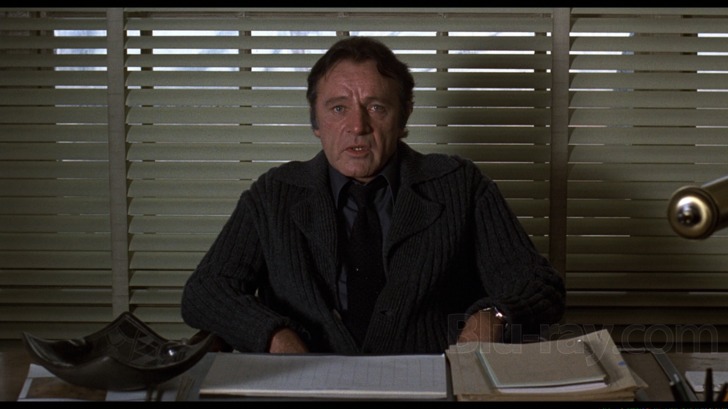
While it’s understandable why some who saw the stage version of Equus were thrown for a loop by the film’s more ostensibly realistic approach, one has to wonder how the public at large would have reacted had Shaffer and director Sidney Lumet gone the “filmed play” route and featured guys wearing horse heads throughout the adaptation? Wouldn’t that have raised an ever larger hue and cry? As it stands, Shaffer does bend some traditional “rules” of cinema, including having Dysart direct several first person confessionals smack dab at the camera. This sort of gambit is easily accepted in a theater—after all, there is a live performer and a live audience there looking at each other, and so any “conversation” (albeit one sided) can seem at least potentially normal. But film of course is a decidedly different medium, and this particular conceit may be one of the film’s central issues, perhaps even more so than its use of actual horses. (It’s notable that none other than Steven Spielberg encountered at least part of the same dilemma when he brought War Horse to the screen a few years ago. The play utilized puppets in the place of horses, but Spielberg at least could point back to the literary source for the play — and of course ultimately the film—to rationalize his realistic approach.)
There’s also a built in complexity to Equus which has nothing to do with its presentation, and that labyrinthine quality may in fact have been just as responsible as anything for turning off prospective audiences. Shaffer’s exploration of Alan’s roiling psyche tends to deal in a lot of transference, to the point where horses become stand-ins for both Jesus and God himself and where this religious underpinning is also fraught with a sexual subtext. Part of Alan’s sexual questioning is due to the oddly disparate approaches of his parents, a fanatical Bible verse spouting mother (played brilliantly by Joan Plowright) and an atheistic, and (it’s ultimately revealed) hedonistic father, played by Colin Blakely. Alan’s confusion is only increased when he becomes attracted to a pretty young girl named Jill (Jenny Agutter), who gets Alan a job at a local stable.
Shaffer isn’t only dealing with Alan’s fractured psyche, however. Dysart has his own baggage, including a recurring dream where he’s an officiant at an ancient ritual where he’s disemboweling countless children. Dysart is haunted by the fact that when he “cures” troubled kids, he’s consigning them to lives of stifling conformity, something he himself feels he’s fallen victim to. All of this makes for an extremely heady experience, and one that often defies the kind of CliffsNotes ethos that some filmgoers—even those in the 1970s—seem to prefer.
What remains is a somewhat problematic but always incredibly visceral experience that offers a slate of unbelievably compelling performances. Burton’s world weary take on Dysart shows both the frustration and nobler intentions of the character, while Firth is simply astounding in a role that really should have won him the Academy Award for Best Supporting Actor (Jason Robards prevailed for Julia that year). Lumet was an expert at crafting claustrophobic films, and the wonder is that he once again triumphs in mood (if not always in style) in a film that features so many wide open spaces.
Equus Blu-ray Movie, Video Quality 
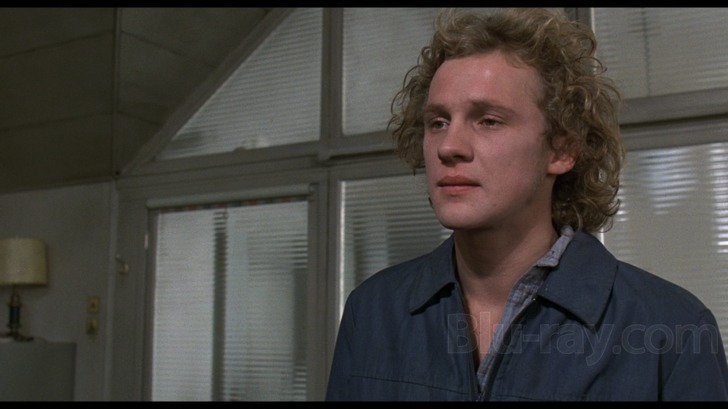
Equus is presented on Blu-ray with an AVC encoded 1080p transfer in 1.85:1. This is a virtually flawless transfer that offers a beautifully organic experience which reproduces the lustrous shadow drenched cinematography of the legendary Oswald Morris. While there are some brightly lit outdoor sequences, moments when colors pop quite vividly and the image's sharpness is excellent, a lot of this film is bathed in an almost chiaroscuro look, especially in some of the film's most effective moments, when Alan takes nighttime rides. Contrast is solid across all light situations, offering excellent shadow detail in even extremely dim scenes. Lumet favors extreme close-ups quite a bit of the time (some are shown in the screenshots accompanying this review), and those reveal excellent fine detail in everything from Alan's disheveled hair to Dysart's tweedy jackets. There are a couple of minor though noticeable anomalies, including a momentary warping at around the 16:39 mark, moments which aren't of any major import but which will be apparent to ardent videophiles.
Equus Blu-ray Movie, Audio Quality 
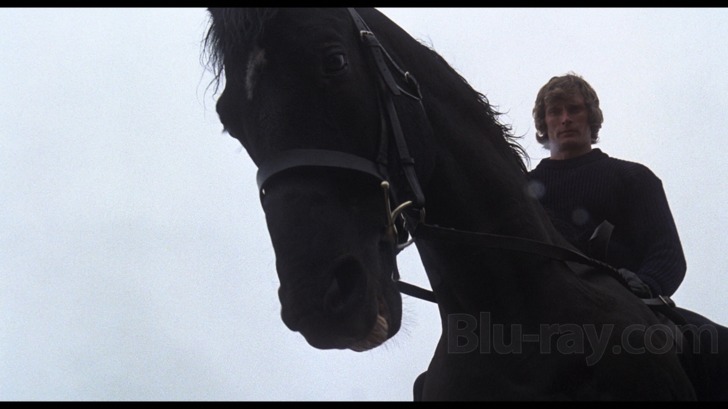
Equus' lossless DTS-HD Master Audio Mono mix nicely recreates the film's original soundtrack, delivering what is ultimately a pretty dialogue heavy film with excellent fidelity. Richard Rodney Bennett's minimal score and some of the horse foley effects all sound just fine as well, with excellent reproduction of all frequency ranges. The track shows no damage of any kind.
Equus Blu-ray Movie, Special Features and Extras 
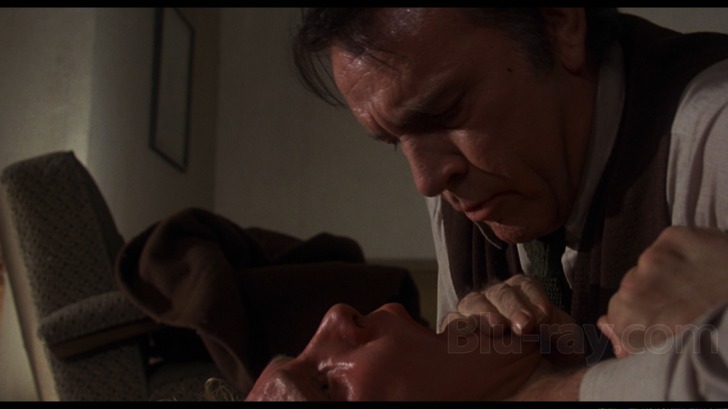
- In From the Cold: The World of Richard Burton (1080p; 2:06:00) is an absolutely first rate 1988 documentary profiling the iconic actor, filled with insightful interviews (including several archival ones with Burton himself) and some brief but enjoyable snippets from several of his films.
- Theatrical Trailer (1080p; 2:00)
- MGM 90th Anniversary Trailer (1080p; 2:06)
- Isolated Score Track is presented via DTS-HD Master Audio 2.0.
- Audio Commentary with Julie Kirgo and Nick Redman. The two regular Twilight Time commentators apologize for both feeling under the weather as the commentary was recorded, but go on to give a typically fact filled account of the film and its principal cast and crew, including several interesting biographical nuggets about Shaffer.
Equus Blu-ray Movie, Overall Score and Recommendation 
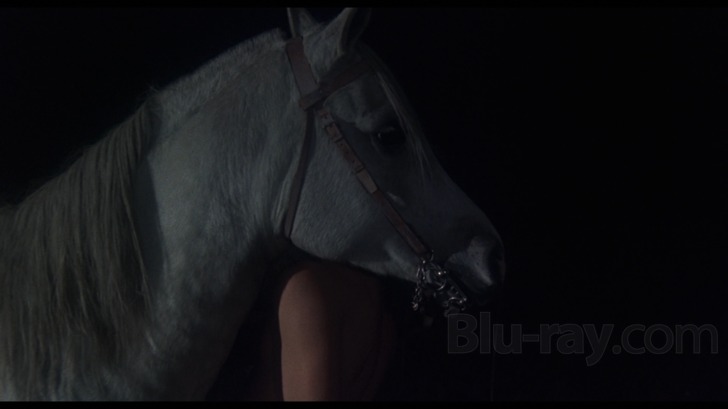
Make no mistake about it, if you really want to experience Equus in all its multilayered majesty, it's essential that you see it in a well directed and mounted (no pun intended) stage production. But I'm not one of those who decries how Shaffer and Lumet chose to saunter this piece into the medium of film. Does it always work? No. But does it still retain some of the essential power of the original stage piece? Absolutely. The film certainly is a worthwhile, and even devastating, experience, one which documents two remarkable performances by Burton and Firth. This Blu-ray's technical merits are outstanding and Equus comes Highly recommended.
Similar titles
Similar titles you might also like

The Silence
Tystnaden
1963

Spider
2002

Antichrist
2009

Repulsion
1965

Nymphomaniac: Volume II
2013

Madeline's Madeline
2018

Freud
Freud: The Secret Passion
1962

Young & Beautiful
Jeune et jolie / Slipcover in Original Pressing
2013

On the Beach at Night Alone
밤의 해변에서 혼자 / Bamui haebyeoneseo honja
2017

The Three Faces of Eve
Fox Studio Classics
1957

Through a Glass Darkly
Såsom i en spegel
1961

Beyond the Hills
După dealuri
2012

Black Narcissus
1947

Mustang
2015

The Club
El Club
2015

Damage
1992

Under the Sand
Sous le sable
2000

The Snake Pit
Limited Edition to 3000
1948

Endless Poetry
Poesía sin fin
2016

Personal Shopper
2016
